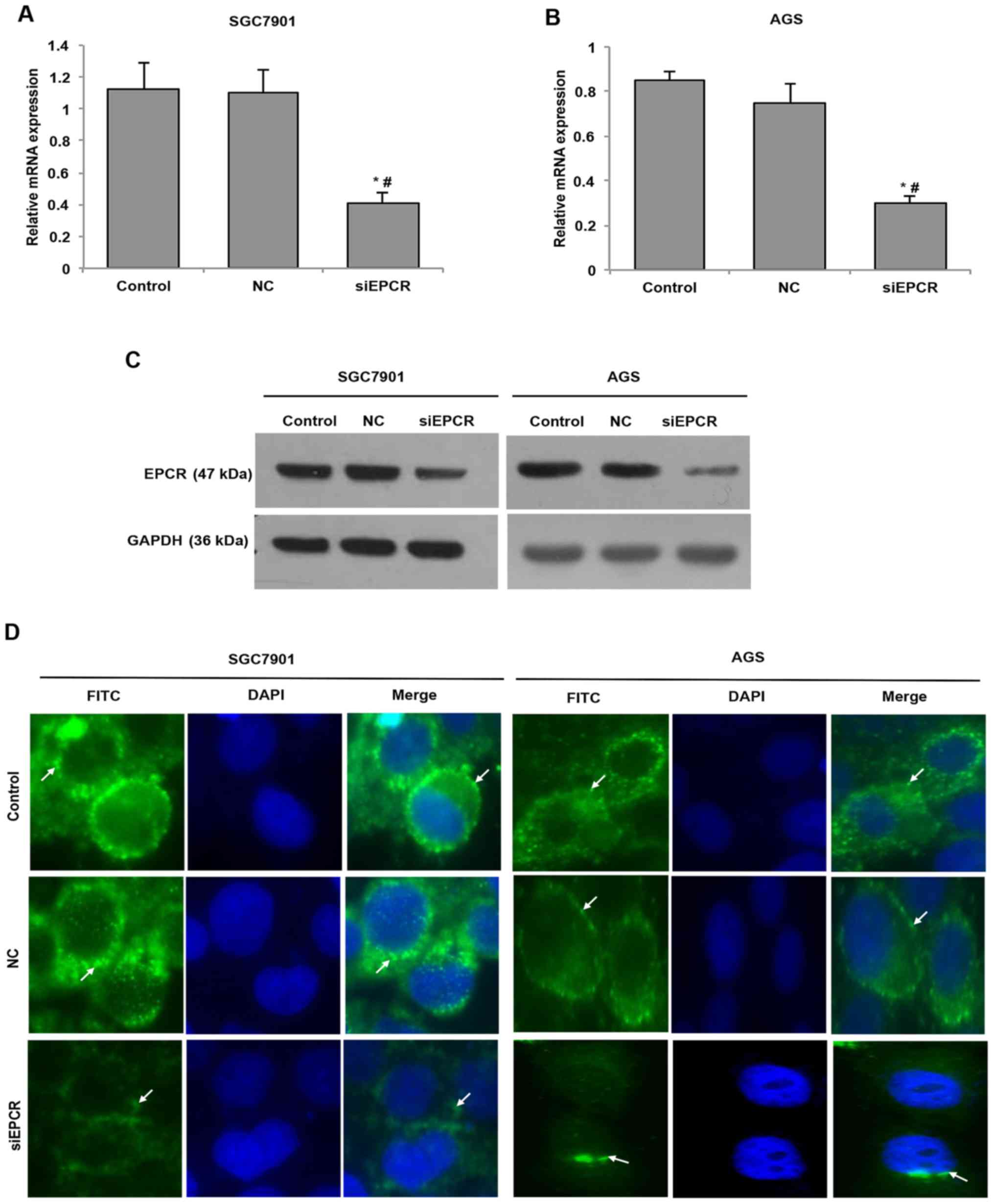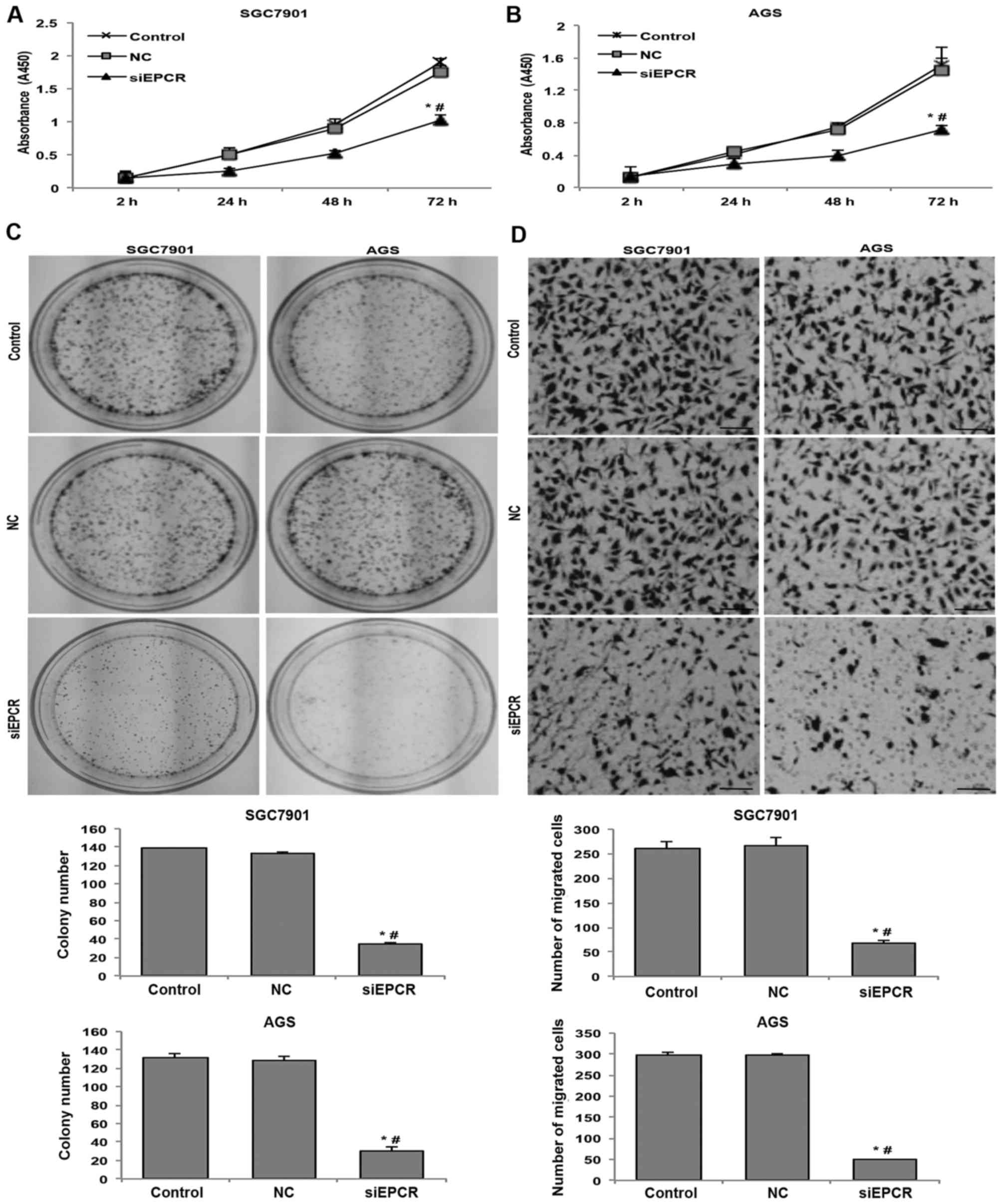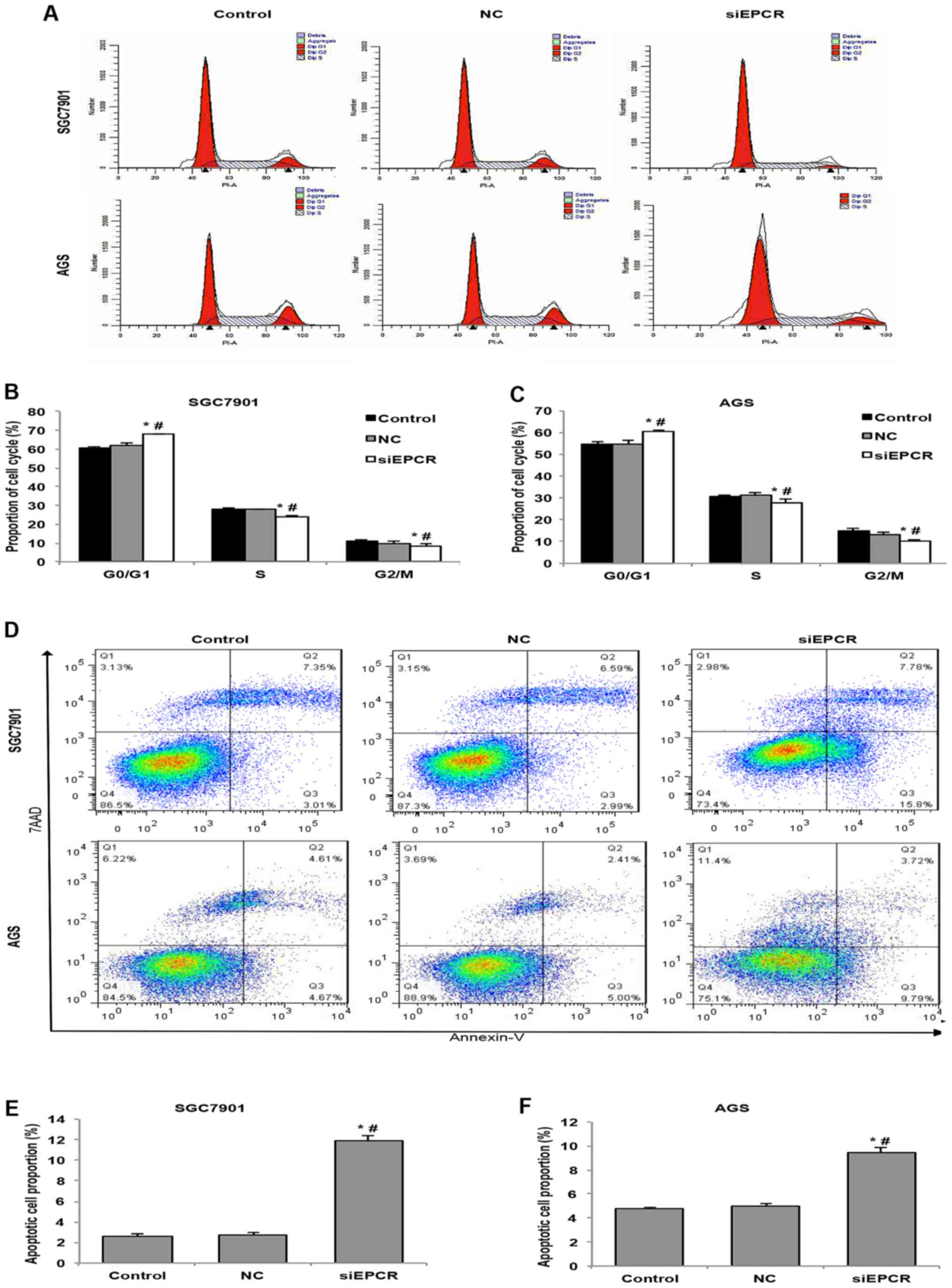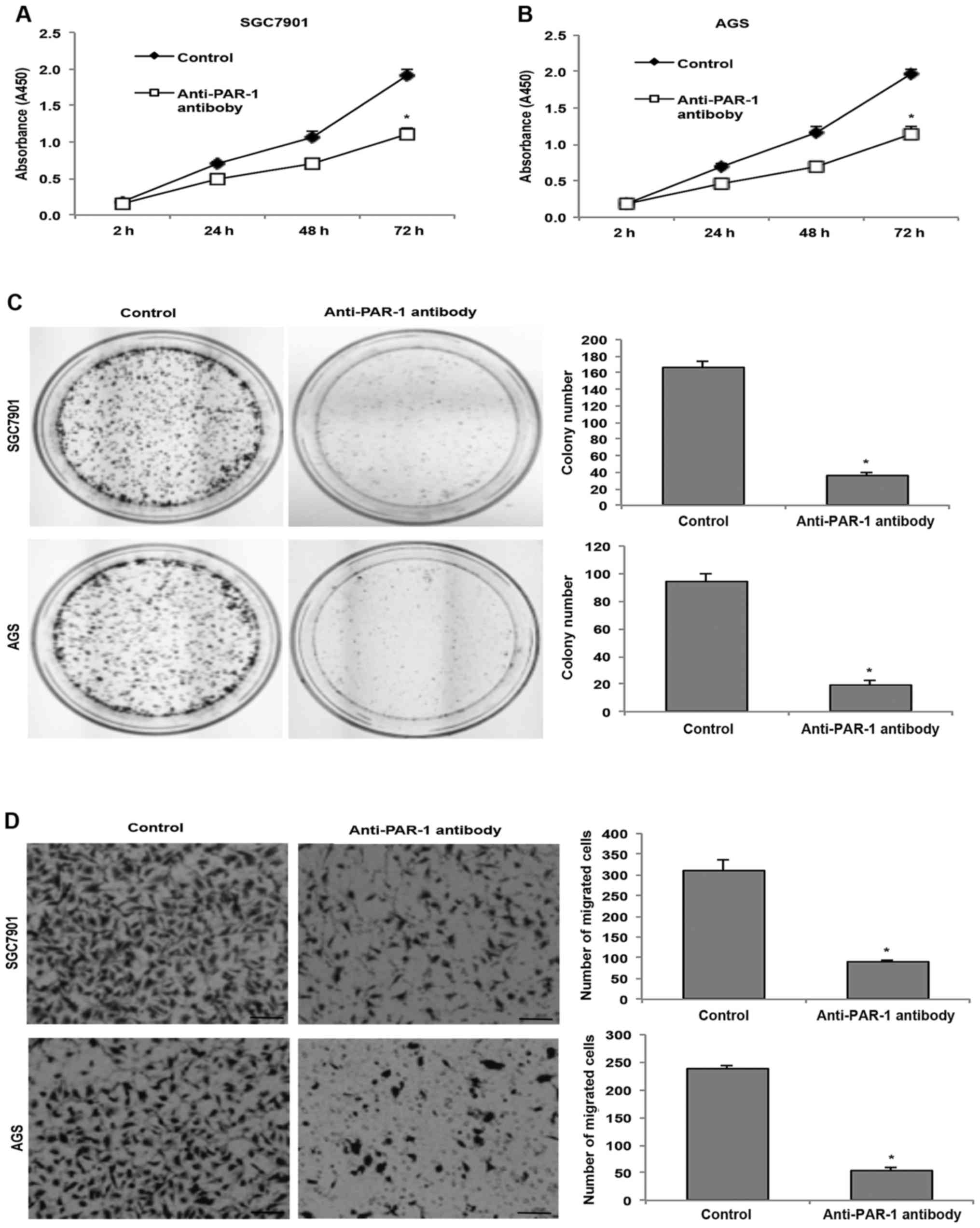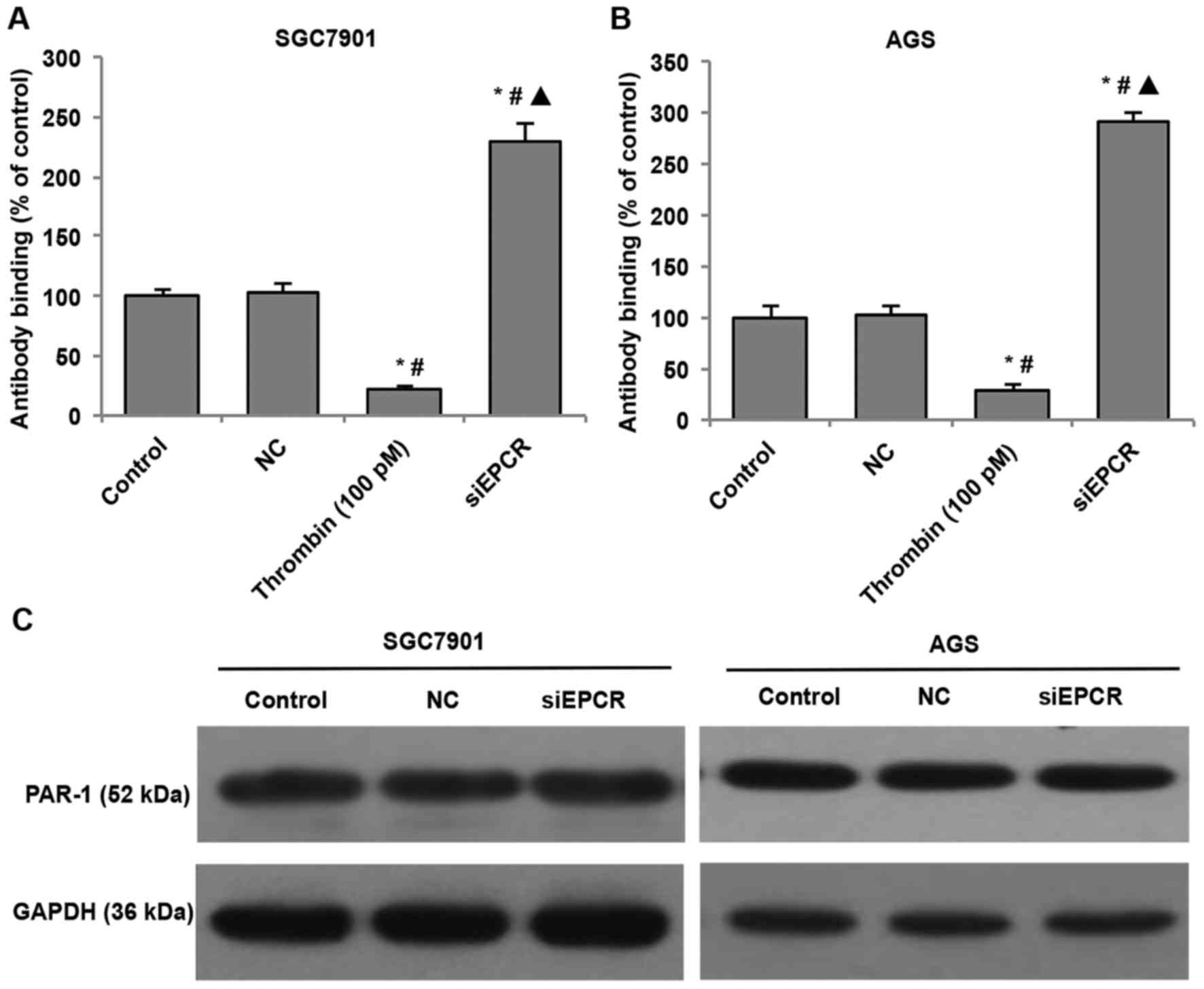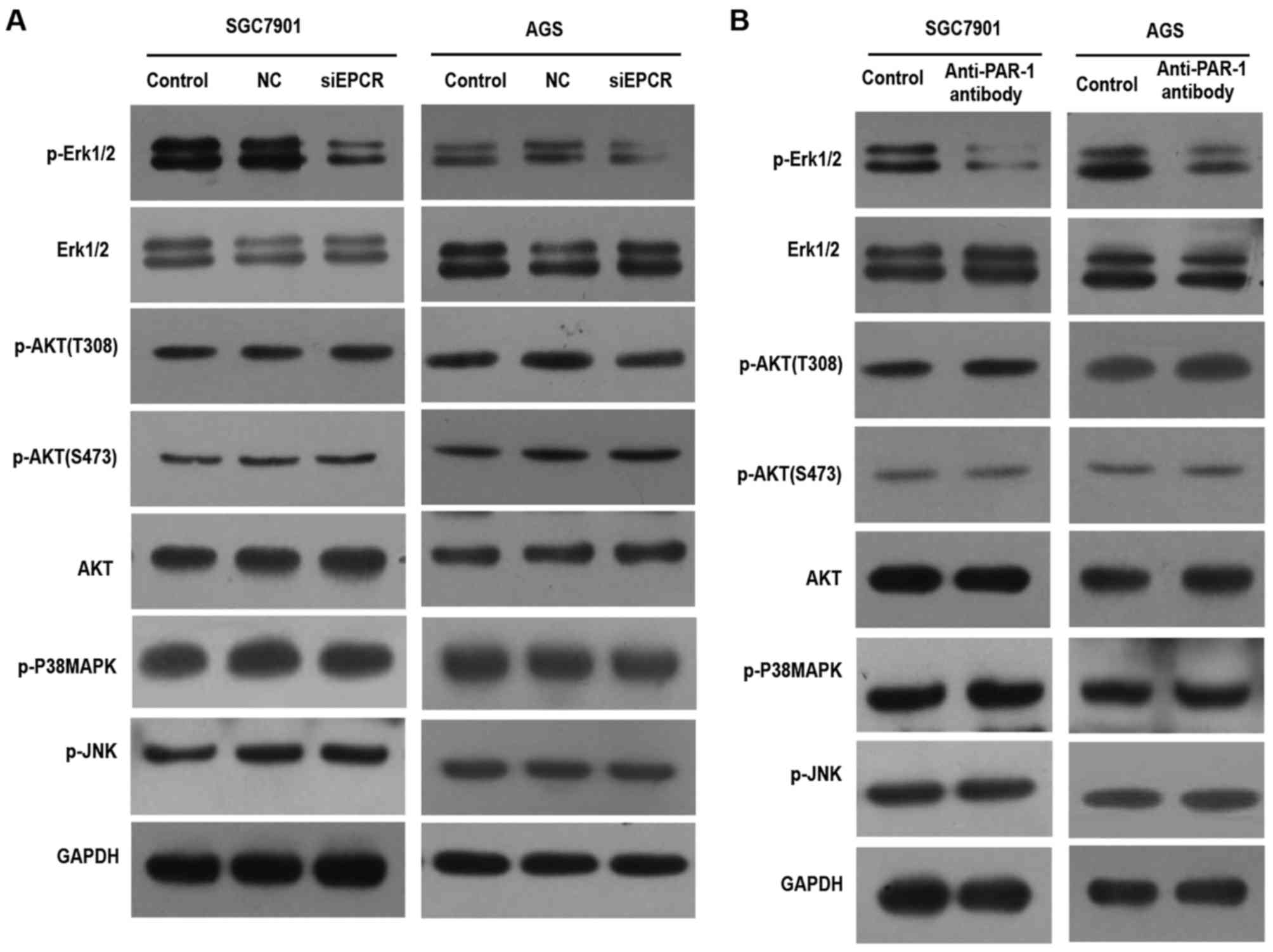|
1
|
Shao Y, Sun K, Xu W, Li XL, Shen H and Sun
WH: Helicobacter pylori infection, gastrin and cyclooxygenase-2 in
gastric carcinogenesis. World J Gastroenterol. 20:12860–12873.
2014. View Article : Google Scholar : PubMed/NCBI
|
|
2
|
Jackson C, Cunningham D and Oliveira J;
ESMO Guidelines Working Group, : Gastric cancer: ESMO clinical
recommendations for diagnosis, treatment and follow-up. Ann Oncol.
20 Suppl 4:34–36. 2009. View Article : Google Scholar : PubMed/NCBI
|
|
3
|
Fukudome K and Esmon CT: Identification,
cloning, and regulation of a novel endothelial cell protein
C/activated protein C receptor. J Biol Chem. 269:26486–26491.
1994.PubMed/NCBI
|
|
4
|
Ghosh S, Pendurthi UR, Steinoe A, Esmon CT
and Rao LV: Endothelial cell protein C receptor acts as a cellular
receptor for factor VIIa on endothelium. J Biol Chem.
282:11849–11857. 2007. View Article : Google Scholar : PubMed/NCBI
|
|
5
|
Dahlbäck B and Villoutreix BO: The
anticoagulant protein C pathway. FEBS Lett. 579:3310–3316. 2005.
View Article : Google Scholar : PubMed/NCBI
|
|
6
|
Taylor FB Jr, Peer GT, Lockhart MS,
Ferrell G and Esmon CT: Endothelial cell protein C receptor plays
an important role in protein C activation in vivo. Blood.
97:1685–1688. 2001. View Article : Google Scholar : PubMed/NCBI
|
|
7
|
Griffin JH, Zlokovic BV and Mosnier LO:
Protein C anticoagulant and cytoprotective pathways. Int J Hematol.
95:333–345. 2012. View Article : Google Scholar : PubMed/NCBI
|
|
8
|
Rezaie AR: Protease-activated receptor
signalling by coagulation proteases in endothelial cells. Thromb
Haemost. 112:876–882. 2014. View Article : Google Scholar : PubMed/NCBI
|
|
9
|
Disse J, Petersen HH, Larsen KS, Persson
E, Esmon N, Esmon CT, Teyton L, Petersen LC and Ruf W: The
endothelial protein C receptor supports tissue factor ternary
coagulation initiation complex signaling through protease-activated
receptors. J Biol Chem. 286:5756–5767. 2011. View Article : Google Scholar : PubMed/NCBI
|
|
10
|
Balazs AB, Fabian AJ, Esmon CT and
Mulligan RC: Endothelial protein C receptor (CD201) explicitly
identifies hematopoietic stem cells in murine bone marrow. Blood.
107:2317–2321. 2006. View Article : Google Scholar : PubMed/NCBI
|
|
11
|
Riewald M, Petrovan RJ, Donner A, Mueller
BM and Ruf W: Activation of endothelial cell protease activated
receptor 1 by the protein C pathway. Science. 296:1880–1882. 2002.
View Article : Google Scholar : PubMed/NCBI
|
|
12
|
Xu J, Qu D, Esmon NL and Esmon CT:
Metalloproteolytic release of endothelial cell protein C receptor.
J Biol Chem. 275:6038–6044. 2000. View Article : Google Scholar : PubMed/NCBI
|
|
13
|
Shabani E, Opoka RO, Bangirana P, Park GS,
Vercellotti GM, Guan W, Hodges JS, Lavstsen T and John CC: The
endothelial protein C receptor rs867186-GG genotype is associated
with increased soluble EPCR and could mediate protection against
severe malaria. Sci Rep. 6:270842016. View Article : Google Scholar : PubMed/NCBI
|
|
14
|
Feistritzer C, Schuepbach RA, Mosnier LO,
Bush LA, Di Cera E, Griffin JH and Riewald M: Protective signaling
by activated protein C is mechanistically linked to protein C
activation on endothelial cells. J Biol Chem. 281:20077–20084.
2006. View Article : Google Scholar : PubMed/NCBI
|
|
15
|
Antón I, Molina E, Luis-Ravelo D, Zandueta
C, Valencia K, Ormazabal C, Martínez-Canarias S, Perurena N,
Pajares MJ, Agorreta J, et al: Receptor of activated protein C
promotes metastasis and correlates with clinical outcome in lung
adenocarcinoma. Am J Respir Crit Care Med. 186:96–105. 2012.
View Article : Google Scholar : PubMed/NCBI
|
|
16
|
Scheffer GL, Flens MJ, Hageman S,
Izquierdo MA, Shoemaker RH and Scheper RJ: Expression of the
vascular endothelial cell protein C receptor in epithelial tumour
cells. Eur J Cancer. 38:1535–1542. 2002. View Article : Google Scholar : PubMed/NCBI
|
|
17
|
Ducros E, Mirshahi S, Azzazene D,
Camilleri-Broët S, Mery E, Al Farsi H, Althawadi H, Besbess S,
Chidiac J, Pujade-Lauraine E, et al: Endothelial protein C receptor
expressed by ovarian cancer cells as a possible biomarker of cancer
onset. Int J Oncol. 41:433–440. 2012. View Article : Google Scholar : PubMed/NCBI
|
|
18
|
Tsuneyoshi N, Fukudome K, Horiguchi S, Ye
X, Matsuzaki M, Toi M, Suzuki K and Kimoto M: Expression and
anticoagulant function of the endothelial cell protein C receptor
(EPCR) in cancer cell lines. Thromb Haemost. 85:356–361.
2001.PubMed/NCBI
|
|
19
|
Keshava S, Sahoo S, Tucker TA, Idell S,
Rao LV and Pendurthi UR: Endothelial cell protein C receptor
opposes mesothelioma growth driven by tissue factor. Cancer Res.
73:3963–3973. 2013. View Article : Google Scholar : PubMed/NCBI
|
|
20
|
Wang Q, Liu Q, Wang T, Yang H, Han Z and
Zhang P: Endothelial cell protein C receptor promotes MGC803
gastric cancer cells proliferation and migration by activating
ERK1/2. Med Oncol. 32:1622015. View Article : Google Scholar : PubMed/NCBI
|
|
21
|
Wojtukiewicz MZ, Hempel D, Sierko E,
Tucker SC and Honn KV: Protease-activated receptors (PARs) -
biology and role in cancer invasion and metastasis. Cancer
Metastasis Rev. 34:775–796. 2015. View Article : Google Scholar : PubMed/NCBI
|
|
22
|
Beaulieu LM and Church FC: Activated
protein C promotes breast cancer cell migration through
interactions with EPCR and PAR-1. Exp Cell Res. 313:677–687. 2007.
View Article : Google Scholar : PubMed/NCBI
|
|
23
|
Schuepbach RA, Feistritzer C, Brass LF and
Riewald M: Activated protein C-cleaved protease activated
receptor-1 is retained on the endothelial cell surface even in the
presence of thrombin. Blood. 111:2667–2673. 2008. View Article : Google Scholar : PubMed/NCBI
|
|
24
|
Bretschneider E, Uzonyi B, Weber AA,
Fischer JW, Pape R, Lötzer K and Schrör K: Human vascular smooth
muscle cells express functionally active endothelial cell protein C
receptor. Circ Res. 100:255–262. 2007. View Article : Google Scholar : PubMed/NCBI
|
|
25
|
Gramling MW, Beaulieu LM and Church FC:
Activated protein C enhances cell motility of endothelial cells and
MDA-MB-231 breast cancer cells by intracellular signal
transduction. Exp Cell Res. 316:314–328. 2010. View Article : Google Scholar : PubMed/NCBI
|
|
26
|
Scaldaferri F, Sans M, Vetrano S, Graziani
C, De Cristofaro R, Gerlitz B, Repici A, Arena V, Malesci A, Panes
J, et al: Crucial role of the protein C pathway in governing
microvascular inflammation in inflammatory bowel disease. J Clin
Invest. 117:1951–1960. 2007. View
Article : Google Scholar : PubMed/NCBI
|
|
27
|
Goldenberg NM, Steinberg BE, Slutsky AS
and Lee WL: Broken barriers: A new take on sepsis pathogenesis. Sci
Transl Med. 3:88ps25. 2011.doi: 10.1126/scitranslmed.3002011.
View Article : Google Scholar
|
|
28
|
Heng W, Mu CY, Chen C, Huang JA and Wang
ZY: Endothelial cell protein C receptor (EPCR) is expressed by lung
carcinoma and correlated with clinical parameters. Clin Lab.
59:375–380. 2013. View Article : Google Scholar : PubMed/NCBI
|
|
29
|
Mohan Rao LV, Esmon CT and Pendurthi UR:
Endothelial cell protein C receptor: A multiliganded and
multifunctional receptor. Blood. 124:1553–1562. 2014. View Article : Google Scholar : PubMed/NCBI
|
|
30
|
Shipitsin M, Campbell LL, Argani P,
Weremowicz S, Bloushtain-Qimron N, Yao J, Nikolskaya T,
Serebryiskaya T, Beroukhim R, Hu M, et al: Molecular definition of
breast tumor heterogeneity. Cancer Cell. 11:259–273. 2007.
View Article : Google Scholar : PubMed/NCBI
|
|
31
|
Park SY, Lee HE, Li H, Shipitsin M, Gelman
R and Polyak K: Heterogeneity for stem cell-related markers
according to tumor subtype and histologic stage in breast cancer.
Clin Cancer Res. 16:876–887. 2010. View Article : Google Scholar : PubMed/NCBI
|
|
32
|
Schaffner F, Yokota N, Carneiro-Lobo T,
Kitano M, Schaffer M, Anderson GM, Mueller BM, Esmon CT and Ruf W:
Endothelial protein C receptor function in murine and human breast
cancer development. PLoS One. 8:610712013. View Article : Google Scholar
|
|
33
|
Keshava S, Kothari H, Rao LV and Pendurthi
UR: Influence of endothelial cell protein C receptor on breast
cancer development. J Thromb Haemost. 11:2062–2065. 2013.
View Article : Google Scholar : PubMed/NCBI
|
|
34
|
Keshava S, Rao LV and Pendurthi UR:
Intrapleural adenoviral-mediated endothelial cell protein C
receptor gene transfer suppresses the progression of malignant
pleural mesothelioma in a mouse model. Sci Rep. 6:368292016.
View Article : Google Scholar : PubMed/NCBI
|
|
35
|
Van Sluis GL, Niers TM, Esmon CT,
Tigchelaar W, Richel DJ, Buller HR, Van Noorden CJ and Spek CA:
Endogenous activated protein C limits cancer cell extravasation
through sphingosine-1-phosphate receptor 1-mediated vascular
endothelial barrier enhancement. Blood. 114:1968–1973. 2009.
View Article : Google Scholar : PubMed/NCBI
|
|
36
|
Zhang Y, Hu SY, Yin T, Tian F, Wang S,
Zhang Y and Chen Y: Liraglutide promotes proliferation and
migration of cardiac microvascular endothelial cells through
PI3K/Akt and MAPK/ERK signaling pathways. Nan Fang Yi Ke Da Xue Xue
Bao. 35:1221–1226. 2015.(In Chinese). PubMed/NCBI
|
|
37
|
Asanuma K, Yoshikawa T, Hayashi T, Akita
N, Nakagawa N, Hamada Y, Nishioka J, Kamada H, Gabazza EC, Ido M,
et al: Protein C inhibitor inhibits breast cancer cell growth,
metastasis and angiogenesis independently of its protease
inhibitory activity. Int J Cancer. 121:955–965. 2007. View Article : Google Scholar : PubMed/NCBI
|
|
38
|
Ducros E, Berthaut A, Mirshahi SS, Faussat
AM, Soria J, Agarwal MK and Mirshahi M: Aldosterone modifies
hemostasis via upregulation of the protein-C receptor in human
vascular endothelium. Biochem Biophys Res Commun. 373:192–196.
2008. View Article : Google Scholar : PubMed/NCBI
|
|
39
|
Bae JS, Yang L and Rezaie AR: Receptors of
the protein C activation and activated protein C signaling pathways
are colocalized in lipid rafts of endothelial cells. Proc Natl Acad
Sci USA. 104:pp. 2867–2872. 2007; View Article : Google Scholar : PubMed/NCBI
|
|
40
|
Bouwens EA, Stavenuiter F and Mosnier LO:
Cell painting with an engineered EPCR to augment the protein C
system. Thromb Haemost. 114:1144–1155. 2015. View Article : Google Scholar : PubMed/NCBI
|
|
41
|
Lingwood D and Simons K: Lipid rafts as a
membrane-organizing principle. Science. 327:46–50. 2010. View Article : Google Scholar : PubMed/NCBI
|















